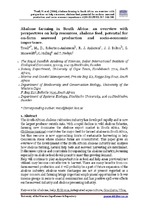Abalone farming in South Africa: an overview with perspectives on kelp resources, abalone feed, potential for on-farm seaweed production and socio-economic importance

View/
Date
2006Author
Troella, M. D.
Robertson-Andersson, Deborah
Anderson, Robert J.
Bolton, John J.
Maneveldt, Gavin
Halling, C.
Probyn, T.
Metadata
Show full item recordAbstract
The South African abalone cultivation industry has developed rapidly and is now the largest producer outside Asia. With a rapid decline in wild abalone fisheries, farming now dominates the abalone export market in South Africa. Kelp (Ecklonia maxima) constitutes the major feed for farmed abalone in South Africa, but this resource is now approaching limits of sustainable harvesting in kelp Concession Areas where abalone farms are concentrated. This paper gives an overview of the development of the South African abalone industry and analyses how abalone farming, natural kelp beds and seaweed harvesting are interlinked. It discusses options and constraints for expanding the abalone industry, focussing especially on abalone feed development to meet this growing demand.
Kelp will continue to play an important role as feed and kelp areas previously not utilised may become cost-effective to harvest. There are many benefits from on-farm seaweed production and it will probably be a part of future expansion of the abalone industry. Abalone waste discharges are not at present regarded as a major concern and farming brings important employment opportunities to lower income groups in remote coastal communities and has positive spill-over effects on the seaweed industry and abalone processing industry.
